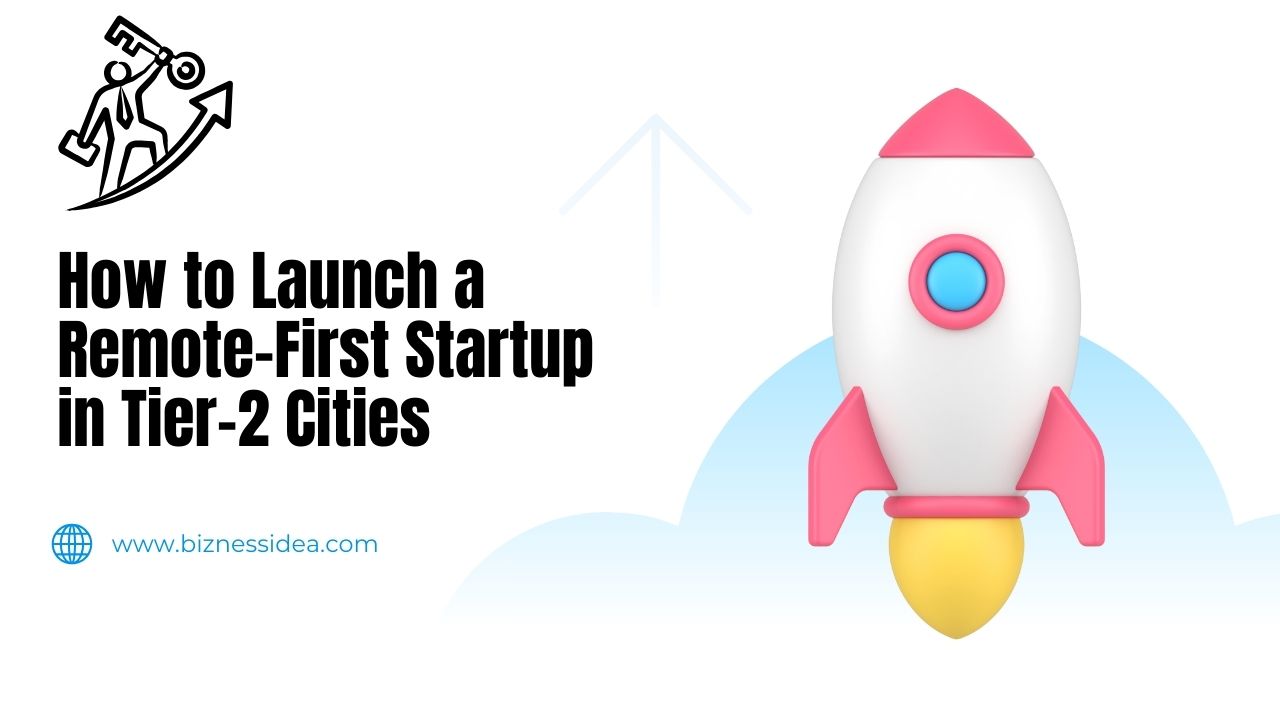The Indian startup ecosystem has gone through a remarkable shift in the last few years. From the rise of remote work post-pandemic to the development of Tier-2 cities as startup hubs, entrepreneurs today are no longer restricted to Delhi, Mumbai, or Bangalore. In fact, launching a Remote-First Startup in Tier-2 Cities is now seen as a smarter, cost-effective, and future-proof strategy.
This blog will guide you through the meaning of remote-first startups, why Tier-2 cities are emerging as hotbeds for innovation, the step-by-step process to launch one, challenges you may face, and success stories that can inspire you.
What is a Remote-First Startup?
A remote-first startup is a company designed with remote operations at its core. Unlike remote-friendly companies, where remote work is just an option, remote-first businesses build all systems, tools, and workflows around distributed teams.
Remote-first meaning goes beyond allowing employees to work from home. It creates an environment where location does not limit growth. Employees from different cities—or even countries—are equally integrated into the culture.
This model has major implications for hiring. Founders can access a wider talent pool, reduce attrition, and maintain diversity in teams. For India, Tier-2 cities are ideal to test this model because of affordable infrastructure, growing digital penetration, and availability of skilled workers who no longer wish to migrate to metros.
Why Remote-First Startups in Tier-2 Cities are Booming in India
The COVID-19 pandemic accelerated the adoption of remote work globally. In India, businesses quickly realized that teams could work productively without the need for expensive office spaces. This shift led to a boom in the remote-first startup India culture.
One of the biggest advantages is cost-saving. Running a startup in metros like Bengaluru or Mumbai comes with high rentals, expensive resources, and stiff competition. On the other hand, remote work in Tier-2 cities allows entrepreneurs to build sustainable companies without overspending.
Additionally, the startup culture in Tier-2 India is on the rise. Cities such as Indore, Jaipur, Coimbatore, and Lucknow are now buzzing with entrepreneurs, freelancers, and digital nomads who bring fresh energy to the ecosystem. Local governments are also stepping in with startup-friendly policies, making it easier than ever to launch ventures outside metros.
Why Tier-2 Cities are the New Startup Hubs in India
Affordable Infrastructure and Lower Costs
One of the biggest advantages of starting up in Tier-2 cities is affordability. The cost of a startup in Tier-2 cities is significantly lower compared to metros. Office rentals, employee salaries, and overall living costs are reduced by 30–40%.
Moreover, processes such as company registration, licensing, and setting up small offices are much smoother. For bootstrapped entrepreneurs, these affordable startup hubs in India provide a much-needed financial cushion.
Growing Talent Pool in Tier-2 Cities
India is witnessing a shift where engineers, designers, and digital professionals from metros are moving back to their hometowns. This brain drain reversal has strengthened the Tier-2 city talent pool.
Freelancers, gig economy workers, and remote employees are easily available for startups. With proper training, hiring from Tier-2 cities can give companies a loyal and cost-efficient workforce, boosting the remote workforce in India narrative.
Government Support and Startup Ecosystem
The government has launched multiple initiatives, like Startup India and state-level incubators, to encourage entrepreneurship. Many Tier-2 states are offering tax benefits, grants, and mentorship through startup schemes in Tier-2 cities.
Incubators in Indore, Coimbatore, and Jaipur are providing coworking spaces, mentorship, and access to investors. This government support for startups in India has made smaller cities equally competitive as metros.
Steps to Launch a Remote-First Startup in Tier-2 Cities
Validate Your Startup Idea
The first step is conducting market research in a Tier-2 context. Entrepreneurs must ensure their idea solves a local or digital-first problem. With increasing internet penetration, fintech, edtech, and SaaS startups have a huge scope. Identifying digital-first opportunities is crucial.
Build a Remote-Ready Team
Hiring in Tier-2 cities requires a hybrid approach. Founders should leverage both local hiring and freelance platforms like Upwork, Fiverr, and LinkedIn. With a clear communication process and collaboration tools, remote team hiring in India becomes smooth. Building a remote team in Tier-2 cities also fosters local employment.
Set Up Digital Infrastructure
Remote-first startups need strong digital systems. Essential remote collaboration tools in India include Slack, Zoom, Notion, and Google Workspace. Cloud storage platforms like AWS or GCP ensure scalability. Building a digital infrastructure for startups early reduces future disruptions.
Leverage Local Networks and Co-Working Spaces
Networking plays a critical role in scaling. Founders can join incubators, accelerators, and co-working spaces in Tier-2 cities to connect with other entrepreneurs. These hubs also attract investors, mentors, and talent. Leveraging startup networking in India ensures steady growth.
Challenges of Running a Remote-First Startup in Tier-2 Cities
Internet Connectivity & Infrastructure Issues
Although internet penetration has improved, some Tier-2 and Tier-3 cities still face connectivity challenges. However, the expansion of 5G and government initiatives are slowly solving this problem.
Hiring Skilled Workforce Locally
While talent availability is growing, there may still be a skill gap. Startups must invest in upskilling and training to build strong teams. Partnerships with local colleges can also bridge the gap.
Building Brand Recognition Beyond Local Markets
One major challenge is visibility. Entrepreneurs need to invest in digital marketing and online visibility to build credibility outside local markets. SEO, social media, and content marketing are essential for remote startup issues in India.
Success Stories of Remote-First Startups from Tier-2 Cities
Several startups have already proven the potential of Tier-2 hubs.
- Indore has produced SaaS and fintech companies that operate globally.
- Coimbatore is growing as a manufacturing-tech and IT hub.
- Surat has seen exponential growth in textile-tech and diamond supply chain startups.
- Jaipur is developing into an edtech and tourism-tech hub.
These successful startups in Tier-2 cities in India highlight that innovation is no longer limited to metros. For new founders, such Tier-2 startup case studies are proof that global businesses can emerge from local cities.
Future of Remote-First Startups in India
The future looks promising for remote-first models. With AI, automation, and 5G driving efficiencies, startups will be able to scale faster. Remote-first also aligns with the global gig economy, giving Indian founders access to international markets.
As more entrepreneurs move to smaller cities, the future of startups in Tier-2 India looks stronger than ever. Remote-first startup trends suggest that the next unicorn may well come from a Tier-2 hub.
Conclusion
Launching a Remote-First Startup in Tier-2 Cities is no longer just a cost-saving strategy—it’s a competitive advantage. Entrepreneurs get access to affordable infrastructure, strong local talent, and government support while avoiding the saturation of metros.
The final step is to begin with confidence: validate your idea, build a remote-ready team, set up digital systems, and leverage local networks. With the right mindset, your Tier-2 startup could be the next big success story in India’s entrepreneurial journey.













